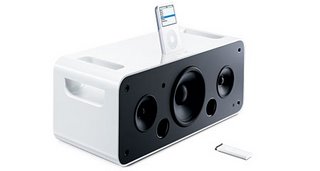
This is Apple's new iPod Hi-Fi. Say hello to the boys and girls, Hi-Fi.
Where is this thing taking us anyway?
After meeting with a less than warm reception the next morning, the initial reviews of Apple's audio lifestyle accessory have started to come in, and they're pretty favorable. This PC Magazine review speaks pretty highly of the Hi-Fi's capabilities. Well, sure. Apple hasn't released any true stinkers in the last several years, regardless of your stance on the Cube PowerMac. First generation quirks aside, Apple employs talented engineers and developers, and their products can usually be counted on to perform decently well. Thankfully the days of things like flaming batteries seem to be behind us. In spite of Steve's hubris-tempting claims of audiophile-quality sound, I was confident that since Apple had actually decided to make a boom box, it would sound pretty good.
The question is, why did Apple decide to make one, and who is it for?
The product unveiling and subsequent media demonstration seems to position the iPod Hi-Fi squarely against the bookshelf stereo, friend to college students and apartment dwellers everywhere. With a list price of $350US, though, Apple has priced the Hi-Fi right out of the reach of the budget-conscious, especially when one can arrange iPod play-through on most $99 bookshelf units with the addition of an inexpensive cable. Many people will say this just another instance of Apple doing what they always do: running an average product through their style and marketing machine, and slapping on a twenty percent price mark up over their competitors. In this case, I'm not sure that I can disagree with them.
There are several other iPod speaker units on the market, made by a whole host of different companies. In fact, an entire eco-system of accessories has sprung up around the iPod since its introduction. A glance at Apple's online store lists 38 different types of speakers alone. Given the bio-diversity of such a market, then, I think we can say that Apple is positioning itself as the 'premium' iPod accessory manufacturer. There's room for everybody, but the Apple-branded iPod accessories will be the creme de la creme, and priced accordingly.
iPodGarage supposes that Apple's expanding iPod accessory offerings are a growth investment in the iPod aftermarket, and that
"...as it appears now, Apple's primary goal in launching the iPod Hi Fi is to send all forty million iPod users to the store in search of an iPod-specific speaker system of some kind. And as long as you go home with one, Apple doesn't much care which one you go home with."This just isn't borne out by our past experience with Apple. The company learned its cautionary lesson during the 90's to never again make the mistake of spending production dollars on an item that can't sell on its own merits. I think what we have here is a case of Apple seeing a market and deciding that they can serve that market better than anyone else. Why this market though? How did Apple end up making boom boxes and cases for the iPod anyway?
Anyone who has followed Apple for the last few years doesn't need the recap, but in most estimations, the iPod kept the company's head above water when computer sales were slackening. It wasn't the first digital audio player, but it became the strongest thanks to Apple's designers and marketing pros. At the launch, Apple fans took the iPod to be a smart move in support of the core computing and software business. An iPod is useless without a computer to connect it to, and the components that one would need to make a DAP are available from the same channel partners that supply Apple's computer components. "Synergies!" we all whispered under our breath. The moment Apple's annual reports began to mention the 'halo effect' of iPods driving the sales of personal computers has become the point at which the tide turned. The iPod brand is now the strongest that Apple has to offer and sales revenues for the player lead all other Apple products every year. With the success of the iPod, Apple has started to resemble a consumer electronics company more and more, and maybe this has become the goal.
Apple dominates the DAP market, arguably the most lucrative consumer electronics prize around, and a market that was Sony's to lose after their dominance with the Walkman and Discman. With a Mac mini and an Airport Express, Apple seems to be making an ever stronger play to be taken out of the home office and into the entertainment center. We were introduced to the idea of the digital hub a few years ago, and at that point it was kind of an amorphous concept, not really anything more than a few pieces of clip art in a PowerPoint slide. I submit that Apple has decided that rather than have your Mac be your digital hub, they are positioning Apple itself as your digital hub, providing content and consumer electronic devices and accessories for everything, from one's desktop to the television, all the way to the street. Whether or not this is borne out remains to be seen, but it's clear that Apple stopped being solely a computer company long ago. Now, we're just waiting to see what they are.


